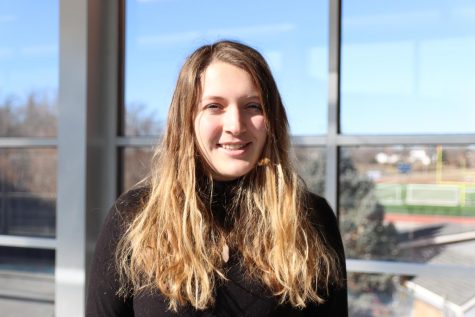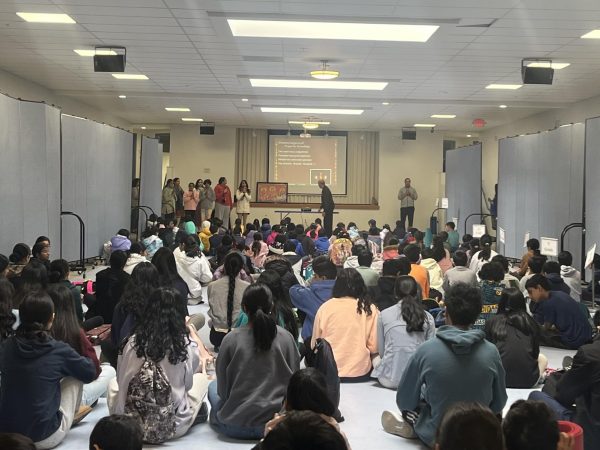Different Religions’ Views on Mental Health and Suicide
Media by Marin Ellington
Mental Health is something that many people struggle with, and Fr. Christopher Martin, Pastor of St. Clare of Assisi Parish, sees faith to be a outlet for advocacy. “[Depression] can also become a spiritual issue that leads to despair, and this is where faith, prayer and community can assist individuals in knowing that they are not alone, that God is always with us, and the future is always full of hope and possibility,” Fr. Martin said.
“Taking a life is not permissible or allowed in our religion.”
This tends to be a theme for many main religions, and Tamima Hasan, senior and co-president of Muslim Student Association (MSA), pulls the same understanding from her faith, Islam.
In Islam, the common belief is that Allah is the only one who can remove people from this world and because Allah says people should not harm themselves, one would technically be committing a sin if they took their own life, Hasan said.
“I agree with the reasoning of [the belief that it is a sin], and obviously no one should feel or have that solution of taking their own life,” Hasan said. “But mental health should be more advertised out and spoken on behalf of in all religions so it doesn’t come to suicide.”
The Islamic community often focuses on the importance of one’s mental health and encourages individuals to take the time to check on their emotional well-being.
“Mental health is mentioned in our religion and very much proclaimed,” Hasan said. “It’s a stigma that brown families or Arabs, their parents don’t believe in mental health or any mental health illnesses and swear away from that topic of conversation that needs to be brought up.”
Hasan has found her religion to be a great source of advocacy in her own mental health outreach and often finds herself reading or listening to the Quran or praying to calm her mind.
“It’s eye-awakening how vulnerable people are in this world, and it’s becoming an easy out-way of releasing any pain that you might be feeling which it should not have come to,” Hasan said. “I personally feel when I’m low or when I’m not in the right state of mind, I turn to my religion most of the time, and it eases me.”
Students of other religions also have found a supportive outlet among their communities when dealing with mental health issues.
Sophia Russell, sophomore, is a non-denominational Christian who has found aid through a deep connection among church groups she attends.
Russell’s understanding of mental health began to develop after a culmination of emotion stemming from starting high school. It wasn’t until she spoke with her youth group that she realized how many people struggle with mental health.
The perception among Christian religions tends to be that suicide is a sinful act, and the Catechism of the Catholic Church says “it is gravely contrary to the just love of self.”
“We as humans were made and created to help and support one another, to be there for each other through the best and the worst,” Russell said. “ We should be connecting with one another and using this as a way to build relationships with each other and strengthen our relationship with God.”
Though she has received support from her faith community, Russell is aware of the negative perceptions that surround the topic in society in regards to religious institutions.
“It shouldn’t be this taboo topic in society, but it is because people don’t know how to talk about it and address it correctly,” Russell said. “Maybe there isn’t a correct way, but there is a way to always keep it as an opportunity.”
It is often misperceived that Christians believe anyone who commits suicide is going to hell, when in fact the Bible never specifically condemns this fate to those people.
Ultimately, the Church believes if a person accepts Jesus into their heart they will go to heaven. Russell said mental health advocacy is open communication and continued sharing allows for stigma regarding the topic to be addressed and resolved.
“He gets me through the battles because He wins the war,” Russell said.
Judaism similarly understands the altered mental state one reaches when they feel suicide may be their only option. Often the belief that the person should not be held accountable for their actions is sustained in order to avoid unique burial rituals and allow for the family to mourn in a way that leads them to peace.
Rabbi Elizabeth Hersh of Temple Emanuel practices Judaism from the Reform perspective and works to make sure her congregation is aware of resources available to them for any help they may need.
Temple Emanuel is a relatively small congregation which allows for Rabbi Hersh to maintain personal relationships with each individual. Though they are small, the congregation focuses heavily on inclusion and acceptance.
“In the best possible way, I always say we have no boundaries,” Rabbi Hersh said. “When people feel like they have somewhere where they can belong, I think that helps their mental health.”
Reform Judaism is clear that mental health should be a priority and considers it to be as important as physical health in the well-being of human beings.
“Preserving life in Judaism is the highest principle,” Rabbi Hershe said. “You do anything for the sake of life.”
Being aware and taking the time to notice things that may be out of the ordinary is the best way to be able to identify those who need help, Rabbi Hersh said. She reaches out if she notices someone stops coming to services or to classes and she tries to be sensitive and aware of the situation.
“People struggle because people are human,” Rabbi Hersh said. “It doesn’t matter if you’re a Muslim, Hindu, Jewish or Christian. People struggle.”
A principle in Judaism is everyone is responsible for everyone else. Rabbi Hersh said not everyone reaches out in the same way and it is important to make sure to always be watching and listening.
A Yiddish saying often translated and used in Judaism is “Man plans and God laughs.” Hope is a core foundation of the Jewish faith, Rabbi Hersh said, and keeping life in the perspective that there is always hope for the future no matter what is occurring in the present helps people to continue fighting whatever battles they may be experiencing.
Your donation will support the student journalists of Marquette High School. Your contribution will allow us to purchase equipment and cover our annual website hosting costs. You may become a PATRON by making a donation at one of these levels: White/$30, Green/$50, Blue/$100. Patron names will be published in the print newsmagazine, on the website and once per quarter on our social media accounts.

Marin Ellington (she/her), senior, is the Editor in Chief of the Marquette Messenger. In addition to her involvement in student journalism at Marquette,...








![Mental Health is something that many people struggle with, and Fr. Christopher Martin, Pastor of St. Clare of Assisi Parish, sees faith to be a outlet for advocacy. "[Depression] can also become a spiritual issue that leads to despair, and this is where faith, prayer and community can assist individuals in knowing that they are not alone, that God is always with us, and the future is always full of hope and possibility," Fr. Martin said.](https://marquettemessenger.com/wp-content/uploads/2021/01/File_000-6-900x675.jpeg)
Russ Robins • Jan 27, 2021 at 6:50 PM
Very nice piece!